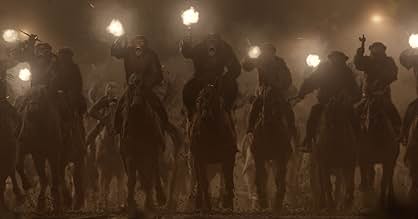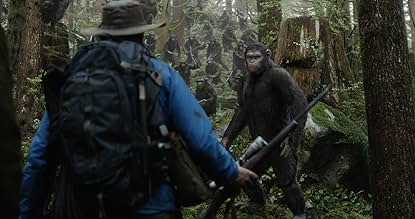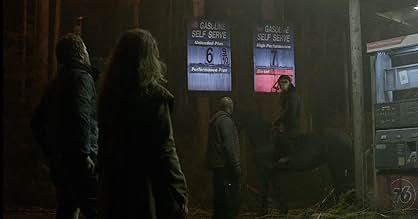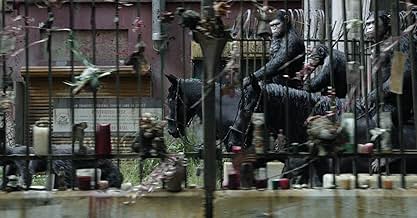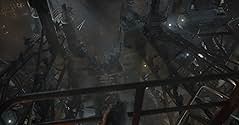Dez anos após sua liberdade, César vive em paz com macacos na floresta próxima a San Francisco, enquanto os humanos enfrentam uma epidemia. Sem energia elétrica, um grupo de sobreviventes pl... Ler tudoDez anos após sua liberdade, César vive em paz com macacos na floresta próxima a San Francisco, enquanto os humanos enfrentam uma epidemia. Sem energia elétrica, um grupo de sobreviventes planeja invadir a floresta para reativar uma usina.Dez anos após sua liberdade, César vive em paz com macacos na floresta próxima a San Francisco, enquanto os humanos enfrentam uma epidemia. Sem energia elétrica, um grupo de sobreviventes planeja invadir a floresta para reativar uma usina.
- Direção
- Roteiristas
- Artistas
- Indicado a 1 Oscar
- 17 vitórias e 48 indicações no total
Larramie Doc Shaw
- Ash
- (as Doc Shaw)
Avaliações em destaque
There are some films you go to see with low expectations and back in 2011 Rupert Wyatt's "Rise of the Planet of the Apes" was one of those. After the Charlton Heston classic, a long series of increasingly poor sequels and a failed Tim Burton reboot, apprehension was high. But how wrong could I be. This was 100% a 10/10 film (if I'd been doing these reviews in those days): an epic and gripping story; great performances from James Franco, John Lithgow, Freida Pinto and Harry Potter star Tom Felton; and stunningly executed special effects, with Andy Serkis's performance delivering amazing depth of feeling and emotion. (The scene where Serkis's character Caesar first speaks is one of my top 10 "most goose-bumpy" moments in cinema history).
Now, 4 years later, we have the sequel - Dawn of the Planet of the Apes - which, given how much I loved the original film, I approached with a similar feeling of apprehension. But, I am delighted to say, I was pleasantly surprised.
Dawn of the Planet of the Apes neatly takes over in its opening titles where the closing titles of the first film left off. The so-called Simean flu has wiped out 499 of every 500 people on earth, deftly explaining why James Franco and Freida Pinto fail to reprise their roles in the sequel: in fact it would have been an unrealistic cop-out if either had done. Instead - monkey business aside - we have a brand new human cast led by Jason Clarke ("Zero Dark Thirty", "The Great Gatsby"), Keri Russell ("MI-3's" 'bomb in the head' girl) and heavy hitter Gary Oldman. These characters are trying to rebuild a new society for the survivors in San Francisco, but their desire for power (of the volts and amps variety) puts them in direct conflict with the emerging simian society deep in the redwoods. Much conflict ensues, not only between the two tribes but between the factions of the two societies.
Once again, there is a good story by original writers Rick Jaffa and Amanda Silver, joined by Mark Bomback: underneath the set-piece action sequences, the majority of the drama comes from the relationships between the characters, and especially that between Caesar (Serkis) and his estranged son played extremely well by Nick Thurston, culminating in a remarkable stand-out scene between the two in Caesar's old home that is genuinely moving. And another specific callout was Yorkshire-born Toby Kebbell playing the emotionally and mentally wounded Koba: his scenes in the human armoury - think Heath Ledger's Joker crossed with PG Tips advert - are both funny and distubing in equal measure.
Is it as good as "Rise"? No, not in my view. The first film was novel and deep, and "Dawn" is more superficial in comparison. It is also far more of an action film (or "a bit fighty" as my dear wife described it), with some standout battle scenes that are a masterpiece of special effects. If "Rise" could be compared to the original "Alien", "Dawn" is much more like "Aliens" - wham, bang, thank-you Simian.
The director this time is wunderkind Matt Reeves ("Cloverfield", "Let Me In"), directing with panache and a narrative drive that only occasionally lets up for emotional punch. The acting is good and (as flagged above) the special effects are outstanding: the production team clearly saw "I am Legend" and wanted to go one better with the San Francisco streets. And all topped off with a fine and un-obtrusive score by Michael Giacchino.
Highly recommended, and I am now looking forward to the next sequel, planned for a 2016 release.
(If you enjoyed this review, please see my library of other reviews at bob-the-movie-man.com and enter your email address to "Follow the Fad". Thanks.)
Now, 4 years later, we have the sequel - Dawn of the Planet of the Apes - which, given how much I loved the original film, I approached with a similar feeling of apprehension. But, I am delighted to say, I was pleasantly surprised.
Dawn of the Planet of the Apes neatly takes over in its opening titles where the closing titles of the first film left off. The so-called Simean flu has wiped out 499 of every 500 people on earth, deftly explaining why James Franco and Freida Pinto fail to reprise their roles in the sequel: in fact it would have been an unrealistic cop-out if either had done. Instead - monkey business aside - we have a brand new human cast led by Jason Clarke ("Zero Dark Thirty", "The Great Gatsby"), Keri Russell ("MI-3's" 'bomb in the head' girl) and heavy hitter Gary Oldman. These characters are trying to rebuild a new society for the survivors in San Francisco, but their desire for power (of the volts and amps variety) puts them in direct conflict with the emerging simian society deep in the redwoods. Much conflict ensues, not only between the two tribes but between the factions of the two societies.
Once again, there is a good story by original writers Rick Jaffa and Amanda Silver, joined by Mark Bomback: underneath the set-piece action sequences, the majority of the drama comes from the relationships between the characters, and especially that between Caesar (Serkis) and his estranged son played extremely well by Nick Thurston, culminating in a remarkable stand-out scene between the two in Caesar's old home that is genuinely moving. And another specific callout was Yorkshire-born Toby Kebbell playing the emotionally and mentally wounded Koba: his scenes in the human armoury - think Heath Ledger's Joker crossed with PG Tips advert - are both funny and distubing in equal measure.
Is it as good as "Rise"? No, not in my view. The first film was novel and deep, and "Dawn" is more superficial in comparison. It is also far more of an action film (or "a bit fighty" as my dear wife described it), with some standout battle scenes that are a masterpiece of special effects. If "Rise" could be compared to the original "Alien", "Dawn" is much more like "Aliens" - wham, bang, thank-you Simian.
The director this time is wunderkind Matt Reeves ("Cloverfield", "Let Me In"), directing with panache and a narrative drive that only occasionally lets up for emotional punch. The acting is good and (as flagged above) the special effects are outstanding: the production team clearly saw "I am Legend" and wanted to go one better with the San Francisco streets. And all topped off with a fine and un-obtrusive score by Michael Giacchino.
Highly recommended, and I am now looking forward to the next sequel, planned for a 2016 release.
(If you enjoyed this review, please see my library of other reviews at bob-the-movie-man.com and enter your email address to "Follow the Fad". Thanks.)
"I always think... ape better than human. I see now... how much like them we are."
After the magnificent "Rise of the Planet of the Apes" from 2011, Caesar the legendary ape who started the revolution for his species, can show up again in this sequel. It's 10 years later and the world has been decimated thanks to the Simian virus. This flu originated from a genetically engineered virus and ensured that the apes became systematically wiser. The magisterial beginning shows Caesar in close-up and from there it's a run-up to an amazing first 20 minutes in which no human is seen and we witness the ins and outs of the apes commune, who communicate by use of a kind of sign language. They have retreated into a mountainous forest near San Francisco, where they have formed a primitive society with Caesar as the absolute leader. They lead a peaceful existence, not aware of the fact that humanity has survived the pandemic. Until such underdeveloped biped turns up one day and immediately shoots an ape at first sight. And that's the beginning of a very interesting struggle for power between two different cultures with survival instinct, self-preservation and demarcating the territory as a central issue. Eventually you start to wonder who really are the primates.
Is it necessary to see this movie in less than no time because of the original story with surprising twists? Nope, not at all. It's not really that exciting and even a normal chimpanzee can predict the outcome. But, it's the amazing design of the apes and the sometimes real human actions and emotional traits that they show. Probably the fact that the actors are "motion captured" has something to do with it, but it's still breathtaking to watch. At certain moments the CGI wasn't quite correct. Especially the fragments of the horse riding apes. You can notice sometimes that these were computer animations. But that's really nitpicking. The Most part looked lifelike and one can only conclude that the authentic episodes of "Planet of the Apes" from the 60's were irrefutable populated by costumed actors.
The final confrontation between humans and apes, with Caesar, again played by Andy Serkis (who formerly also performed as Gollum in TLotR), and Malcolm (Jason Clarke) as the two righteous leaders of the two parties, is of course inevitable. Clearly a socio-political theme was ingeniously woven throughout the cheap, ordinary Hollywood entertainment. The mutual distrust with revenge as the cause for the sneaky tricks and treachery. One group is angry because the apes are supposedly the origin of the extermination of mankind. The other group is unnerved by the years of abuse in laboratories and a doomed life in captivity. The result, of course is a clash with also some internal feuds and conflicts.
Unfortunately after several memorable and downright masterful film clips, we're treated with some ordinary, cheap action movie scenes. A kind of "Expendables meets The A-Team" with heroically swinging of automatic rifles, rockets whizzing around the ears as if the third world war just began and even a tank broke loose. Next to that a big can of sentimentality is pulled open quickly leading to an engaging conversation between Caesar and his son. And then the curtain falls across this magnificent epos with a picture of a real Messiah who parades among his followers. An open end that yearns for an overwhelming third part. But beyond this kitschy final offensive you can admire a few cinematic gems like the appearing of the apes colony in the big city, where they speak to the crowd in an admonishing tone. You could feel the consternation of the crowd after hearing the first words of Caesar. And also the magnificent mimicry Koba used at one time to deceive two armed men. A moment where CGI and facial expressions blend effortlessly. Yes, that's the reason why you should watch this movie.
More reviews at http://opinion-as-a-moviefreak.blogspot.be
After the magnificent "Rise of the Planet of the Apes" from 2011, Caesar the legendary ape who started the revolution for his species, can show up again in this sequel. It's 10 years later and the world has been decimated thanks to the Simian virus. This flu originated from a genetically engineered virus and ensured that the apes became systematically wiser. The magisterial beginning shows Caesar in close-up and from there it's a run-up to an amazing first 20 minutes in which no human is seen and we witness the ins and outs of the apes commune, who communicate by use of a kind of sign language. They have retreated into a mountainous forest near San Francisco, where they have formed a primitive society with Caesar as the absolute leader. They lead a peaceful existence, not aware of the fact that humanity has survived the pandemic. Until such underdeveloped biped turns up one day and immediately shoots an ape at first sight. And that's the beginning of a very interesting struggle for power between two different cultures with survival instinct, self-preservation and demarcating the territory as a central issue. Eventually you start to wonder who really are the primates.
Is it necessary to see this movie in less than no time because of the original story with surprising twists? Nope, not at all. It's not really that exciting and even a normal chimpanzee can predict the outcome. But, it's the amazing design of the apes and the sometimes real human actions and emotional traits that they show. Probably the fact that the actors are "motion captured" has something to do with it, but it's still breathtaking to watch. At certain moments the CGI wasn't quite correct. Especially the fragments of the horse riding apes. You can notice sometimes that these were computer animations. But that's really nitpicking. The Most part looked lifelike and one can only conclude that the authentic episodes of "Planet of the Apes" from the 60's were irrefutable populated by costumed actors.
The final confrontation between humans and apes, with Caesar, again played by Andy Serkis (who formerly also performed as Gollum in TLotR), and Malcolm (Jason Clarke) as the two righteous leaders of the two parties, is of course inevitable. Clearly a socio-political theme was ingeniously woven throughout the cheap, ordinary Hollywood entertainment. The mutual distrust with revenge as the cause for the sneaky tricks and treachery. One group is angry because the apes are supposedly the origin of the extermination of mankind. The other group is unnerved by the years of abuse in laboratories and a doomed life in captivity. The result, of course is a clash with also some internal feuds and conflicts.
Unfortunately after several memorable and downright masterful film clips, we're treated with some ordinary, cheap action movie scenes. A kind of "Expendables meets The A-Team" with heroically swinging of automatic rifles, rockets whizzing around the ears as if the third world war just began and even a tank broke loose. Next to that a big can of sentimentality is pulled open quickly leading to an engaging conversation between Caesar and his son. And then the curtain falls across this magnificent epos with a picture of a real Messiah who parades among his followers. An open end that yearns for an overwhelming third part. But beyond this kitschy final offensive you can admire a few cinematic gems like the appearing of the apes colony in the big city, where they speak to the crowd in an admonishing tone. You could feel the consternation of the crowd after hearing the first words of Caesar. And also the magnificent mimicry Koba used at one time to deceive two armed men. A moment where CGI and facial expressions blend effortlessly. Yes, that's the reason why you should watch this movie.
More reviews at http://opinion-as-a-moviefreak.blogspot.be
9.5
Sequels often carry the heavy burden of expectations, and few films manage to meet these expectations, let alone surpass them. However, "Dawn of the Planet of the Apes" not only meets the criteria of a great sequel but exceeds them in remarkable ways. This cinematic gem, directed by Matt Reeves, expertly continues the story set in motion by its predecessor, "Rise of the Planet of the Apes." What sets "Dawn" apart is its intelligent storytelling, superb character development, and breathtaking visual effects, which collectively elevate it to the ranks of cinematic excellence.
One of the most commendable aspects of "Dawn" is its strategic decision to shift the focus primarily onto the apes. While the human characters in "Rise" were not inherently flawed, they felt somewhat generic, lacking the depth and nuance needed to fully engage the audience. "Dawn" rectifies this flaw by wisely sidelining most of the human characters from "Rise" and bringing the apes to the forefront. This shift not only provides a fresh perspective but also allows for a more profound exploration of the ape society, their emotions, and their struggles.
What truly distinguishes "Dawn of the Planet of the Apes" is its thematic depth. The film seamlessly weaves together complex themes, including survival, leadership, prejudice, and the consequences of human actions on the environment. These themes are not merely brushed upon but are deeply embedded in the narrative, prompting viewers to reflect on the intricacies of human nature and the choices we make as a species. The movie's ability to tackle such weighty themes with finesse is a testament to the skillful craftsmanship of the filmmakers.
Furthermore, the film boasts some of the most impressive visual effects ever witnessed on the big screen. The seamless integration of motion capture technology to bring the apes to life is nothing short of astonishing. Every nuance of emotion, every subtle facial expression is captured with remarkable accuracy, making the audience forget that they are watching CGI creations and instead, empathize deeply with the characters. In particular, the performances of Andy Serkis as Caesar and Toby Kebbell as Koba are nothing short of masterful. Their ability to infuse these digital creations with genuine emotions and humanity is a testament to their acting prowess.
The brilliance of "Dawn of the Planet of the Apes" is not confined to its individual success alone but extends to its impact on the franchise as a whole. The film, along with its subsequent sequel, "War for the Planet of the Apes," revitalized the franchise, breathing new life into a classic series. This resurgence catapulted the "Planet of the Apes" franchise into my personal top 10 list of all time. In conclusion, "Dawn of the Planet of the Apes" stands as a shining example of what a sequel should aspire to be. It delves deep into its characters, explores profound themes, and dazzles the audience with its visual splendor. This film is a testament to the power of storytelling and the limitless possibilities of cinema, leaving an indelible mark on the hearts and minds of viewers, myself included.
One of the most commendable aspects of "Dawn" is its strategic decision to shift the focus primarily onto the apes. While the human characters in "Rise" were not inherently flawed, they felt somewhat generic, lacking the depth and nuance needed to fully engage the audience. "Dawn" rectifies this flaw by wisely sidelining most of the human characters from "Rise" and bringing the apes to the forefront. This shift not only provides a fresh perspective but also allows for a more profound exploration of the ape society, their emotions, and their struggles.
What truly distinguishes "Dawn of the Planet of the Apes" is its thematic depth. The film seamlessly weaves together complex themes, including survival, leadership, prejudice, and the consequences of human actions on the environment. These themes are not merely brushed upon but are deeply embedded in the narrative, prompting viewers to reflect on the intricacies of human nature and the choices we make as a species. The movie's ability to tackle such weighty themes with finesse is a testament to the skillful craftsmanship of the filmmakers.
Furthermore, the film boasts some of the most impressive visual effects ever witnessed on the big screen. The seamless integration of motion capture technology to bring the apes to life is nothing short of astonishing. Every nuance of emotion, every subtle facial expression is captured with remarkable accuracy, making the audience forget that they are watching CGI creations and instead, empathize deeply with the characters. In particular, the performances of Andy Serkis as Caesar and Toby Kebbell as Koba are nothing short of masterful. Their ability to infuse these digital creations with genuine emotions and humanity is a testament to their acting prowess.
The brilliance of "Dawn of the Planet of the Apes" is not confined to its individual success alone but extends to its impact on the franchise as a whole. The film, along with its subsequent sequel, "War for the Planet of the Apes," revitalized the franchise, breathing new life into a classic series. This resurgence catapulted the "Planet of the Apes" franchise into my personal top 10 list of all time. In conclusion, "Dawn of the Planet of the Apes" stands as a shining example of what a sequel should aspire to be. It delves deep into its characters, explores profound themes, and dazzles the audience with its visual splendor. This film is a testament to the power of storytelling and the limitless possibilities of cinema, leaving an indelible mark on the hearts and minds of viewers, myself included.
Positives:
Negatives:
- Directing
- Andy Serkis
- Main cast
- Special effects (Specially the apes)
- Musical score
- Pacing
Negatives:
- Most of the human characters
As someone who really enjoyed Rise of the Planet of the Apes, expectations were high for Dawn of the Planet of the Apes. And apart from a rushed ending and the underdeveloped human characters Dawn of the Planet of the Apes didn't disappoint and is just as good. It looks amazing for starters, the cinematography and lighting are of great beauty and atmosphere and the scenery is equally striking. But the visual highlight, and most likely the best thing about the film, are the special effects for the apes, that they look so real and that it's hard to believe they were done by computer is testament to how good they look. The soundtrack is haunting and rousing with no dirge-like tempos and it doesn't feel overbearing either, even with sound with as much authenticity as here. The script also impresses, it's very intelligently done and has a lot of tension and heart. What impressed even more was how simple and nuanced some of it was, like when the apes speak they only need to say a few words and it still feels like it's saying a lot, a couple of times even a sideways glance brings more impact than you'd think. The story takes a bigger and somewhat bolder approach than Rise of the Planet of the Apes and this is an instance of it working very well, especially with the visceral action sequences which are very tense and look terrific and in the incredibly intense and emotional final act. It's compelling stuff where you feel compassion for and identify with every step of the way with Caesar and his family. Matt Reeves' direction doesn't make the mistake of being overblown or lethargic, there is at least a sense that he knows what he's doing. The acting is solid, Jason Clarke and Keri Russell are charming leads and Gary Oldman while criminally underused still gives a spirited performances. But other than the special effects the other highlight is the characterisation of the apes, which is just superb especially for Caesar(who is by far and way the most relatable and most compelling character in the entire film), Andy Serkis never fails to amaze me. All in all a really well done blockbuster, although the human characters do not register anywhere near as well as the special effects and the apes characterisations. 8/10 Bethany Cox
Você sabia?
- CuriosidadesThe film takes place in 2026.
- Erros de gravaçãoWhen the hydro electricity supply is turned on, the humans say they can now contact other humans on the radios, yet they already had electricity supplied by diesel-powered generators.
- Cenas durante ou pós-créditosAfter the credits there is an audio cue of Apes digging through, and removing rubble and concrete. Then Koba's distinctive breathing is heard, hinting at Koba surviving the fall after his struggle with Caesar.
- ConexõesFeatured in Film '72: Episode dated 5 March 2014 (2014)
- Trilhas sonorasThe Weight
Written by Robbie Robertson
Performed by The Band
Courtesy of Capitol Records, LLC
Under license from Universal Music Enterprises
Principais escolhas
Faça login para avaliar e ver a lista de recomendações personalizadas
Detalhes
- Data de lançamento
- Países de origem
- Idiomas
- Também conhecido como
- El planeta de los simios: confrontación
- Locações de filme
- Empresas de produção
- Consulte mais créditos da empresa na IMDbPro
Bilheteria
- Orçamento
- US$ 170.000.000 (estimativa)
- Faturamento bruto nos EUA e Canadá
- US$ 208.545.589
- Fim de semana de estreia nos EUA e Canadá
- US$ 72.611.427
- 13 de jul. de 2014
- Faturamento bruto mundial
- US$ 710.644.566
- Tempo de duração
- 2 h 10 min(130 min)
- Cor
- Mixagem de som
- Proporção
- 1.85 : 1
Contribua para esta página
Sugerir uma alteração ou adicionar conteúdo ausente







